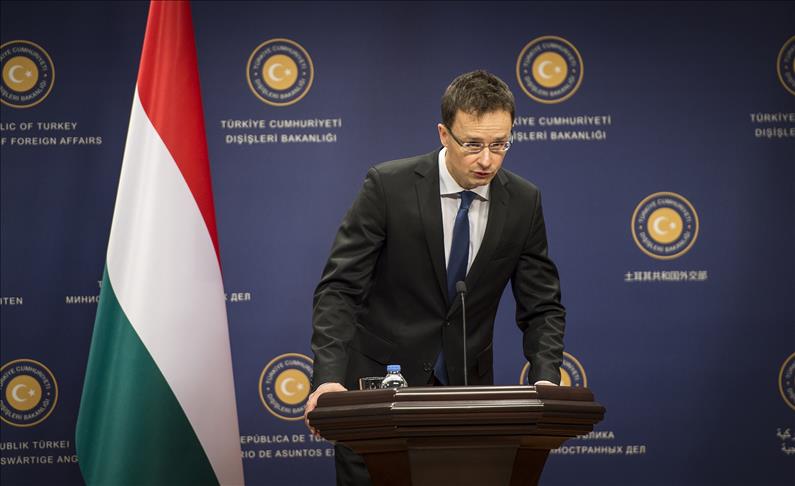
By Diyar Guldogan
ANKARA
All stakeholders in Ukraine must adhere to the existing cease-fire agreement to resolve the crisis, the Hungarian foreign minister told The Anadoluy Agency in Ankara Monday.
In an interview, Peter Szijjarto said "all parties in this conflict have to implement the Minsk Agreement," which was was the only way to solve the crisis.
The Ukrainian government and pro-Russian separatists signed a cease-fire agreement in Minsk on Sept. 5, but both sides have violated it repeatedly. At least 1,363 people have been killed in the conflict since the September 2014 deal.
Hungary shares a border with Ukraine and is closely watching the developments in its neighboring country.
When asked about frequent demonstrations against Hungarian Prime Minister Viktor Orban's government, Szijjarto said, "There were some protests, but I think that anti-government protests are clear signals of democracy."
He said the Hungarian government took opinions of its people seriously.
On Nov. 17, 10,000 Hungarians demonstrated against what they saw as the creation of a small oligarchy based on rising corruption. Protesters were also unhappy about Orban’s close ties with Russia, and his attempts to move away from a liberal commercial economy.
The foreign minister also shared his opinion about developments in Greece, where a leftist party, Syriza, won general elections Sunday. “Hungary has always respected the democratic will of Greek people,” Szijjarto said.
He hoped for an effective and pragmatic cooperation between Hungary and the new Greek government.
“We have some issues that we have to address together, for example, energy security. Hopefully, we will be able to work together effectively,” he said.
About challenges to energy security for central Europe, Szijjarto said, “We have started negotiations with the Turkish government about how to deliver Russian gas through Turkey to Central Europe.”
Last month, Russia scrapped its South Stream project, which was planned to carry gas under the western part of the Black Sea to Bulgaria and further into European markets. Russian President Vladimir Putin offered a new gas pipeline route via the Black Sea to reach Turkey's northwestern Thrace region.
The foreign minister said that Hungary was open to talks with Ankara about how to transmit the gas to central Europe when a deal takes place. "So, until the final agreement gets concluded between Russia and Turkey, we prepare for possible investments on how to deliver gas from the Turkish-Greek border to Europe….most probably through Greece, Macedonia, Serbia, we are having still negotiations with these countries," he said.
Russian President Vladimir Putin and German Chancellor Angela Merkel are also due to visit Hungary in February.
The foreign minister said Germany was a close ally and strategic partner of Hungary. "The visit of Merkel is recognition of our very effective cooperation," he said.
He added Russia was the country's foremost important trading partner and was playing an important role in energy security in central Europe.
Anadolu Agency website contains only a portion of the news stories offered to subscribers in the AA News Broadcasting System (HAS), and in summarized form. Please contact us for subscription options.


